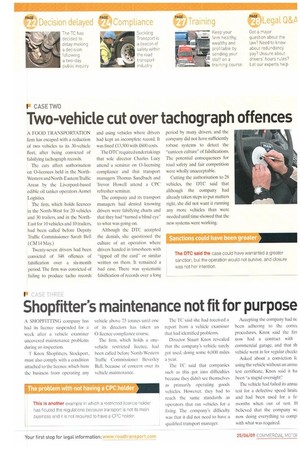F CASE TWO
Page 21

If you've noticed an error in this article please click here to report it so we can fix it.
Two-vehicle cut over tachograph offences
A FOOD TRANSPORTATION firm has escaped with a reduction llof two vehicles to its 30-vehicle fleet, after being convicted of falsifying tachograph records.
The cuts affect authorisation on 0-licences held in the NorthWestern and North-EasternTraffic Areas by the Liverpool-based edible oil tanker operators Armet Logistics.
The firm, which holds licences in the North-West for 20 vehicles and 30 trailers, and in the NorthEast for 10 vehicles and 10 trailers, had been called before Deputy Traffic Commissioner Sarah Bell ( CM 14 May.) Twenty-seven drivers had been convicted of 348 offences of falsification over a six-month period. The firm was convicted of failing to produce tacho records and using vehicles where drivers had kept an incomplete record. It was fined 13500 with .000 costs The DTC required undertakings that sole director Charles Lucy attend a seminar on 0-licensing compliance and that transport managers Thomas Sandbach and Trevor Howell attend a CPC refresher seminar.
The company and its transport managers had denied knowing drivers were falsifying charts and that they had "turned a blind eye" to what was going on.
Although the DTC accepted the denials, she questioned the culture of an operation where drivers handed in timesheets with "tipped off the card" or similar written on them. It remained a had case. There was systematic falsification of records over a long period by many drivers, and the company did not have sufficiently robust systems to detect the "canteen culture" of falsifications. The potential consequences for road safety and fair competition were wholly unacceptable.
Cutting the authorisation to 28 vehicles, the DTC said that although the company had already taken steps to put matters right, she did not want it running any more vehicles than were needed until time showed that the new systems were working.












































































































































